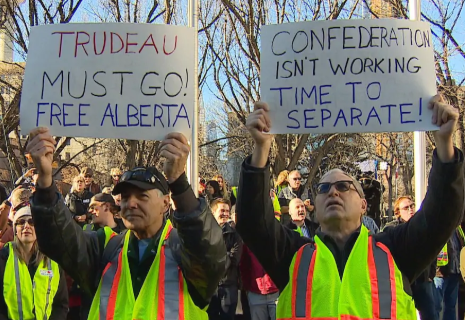Can the threat of separation work as well for Alberta as it has for Quebec?
Jason Kenney, as Jason Kenney really wants you to know, doesn’t want Alberta to separate from Canada. He declared himself a “proud Canadian” a few days after becoming premier of Alberta, an oft-repeated assertion from the 51-year-old lifelong politician. But there are limits: messing with Alberta by hampering its oil industry with needless environmental regulations “will seriously rupture national unity,” Kenney said in May. He has picked fights with Prime Minister Justin Trudeau and Quebec Premier François Legault and ruminated noisily about Alberta’s “frustration and alienation.”
His spiel makes the noted Conservative in Alberta sound an awful lot like a Quebec Liberal of yore. This probably isn’t a coincidence. In invoking separation, and positioning himself as the last bulwark against it, Kenney has glommed onto one of the oldest hustles in the country — one that has served Quebec mightily for decades. His timing is characteristically impeccable; with Quebec’s separatist threat on the wane, the country suddenly lacks a serious existential threat. The question is: can it work for Alberta as it did so well for Quebec?
First, a look at one of the main benefits the separatist threat has brought to Quebec. The province has been a net beneficiary of equalization payments since the system was introduced in 1957. These payments, which come via a pool of money collected by the federal government from taxpayers, continued apace through Quebec’s transformation from largely agrarian economy to its modern-day iteration. The formulas for calculating these always seem to be favourable to Quebec.
Coincidentally or not, the gap between how much Quebecers put in and how much they got out grew steadily larger in the late 1960s, just as the province’s nascent separatist movement began to find its legs. Later, successive provincial Liberal governments leveraged the ensuing threat to the advantage of the province’s purse strings. In 1957, Quebecers put in $39.5 million and received $46 million; about three decades later, after two successive Parti Québécois governments and a bruising referendum, they put in just over a billion dollars and received over $3 billion back. Not a bad return on investment.
There are a few caveats here. Quebec’s per-capita share of equalization dollars is actually quite modest compared to the Atlantic provinces, that other traditional home to the country’s have-nots. And contrary to populist popular belief, Quebec’s vaunted social programs aren’t paid for on the backs of put-upon Albertans, but by the higher provincial taxes paid by Quebecers themselves.
Regardless, the province’s addiction to these payments is particularly strong. Last year, Legault called them “embarrassing” and promised to wean the province off the equalization teat. Yet the youth wing of Quebec’s governing Coalition Avenir Québec party just voted en masse against this very idea last week. Legault, meanwhile, now says Quebec is entitled to the payments. Hypocritical? Perhaps. But also canny: were he to say otherwise, Legault would probably be the first politician on the planet to say no to about $13 billion — the amount Quebec will have harvested this fiscal year.
Jason Kenney is cribbing from the best. Were there a real threat of Alberta separation, Kenney could wring a number of benefits from the rest of the country, starting with a strategic revisit to the equalization formula. Albertans have been net contributors for decades. Such a threat could also help slacken federal environmental laws, which many in Alberta’s oil patch see as anathema to the further development of the industry. It might even help him get a pipeline from the landlocked province to a coast, already.
But Kenney’s problem is this: as Quebec showed time and again, he needs a proper separatist threat to demonize for his hustle to work. Yet the Alberta separatist movement is eternally disorganized and the parties championing it are almost laughably fringe-y. Until this changes — until he has his own Parti Québécois as a foil — his threats sound entirely empty.







































